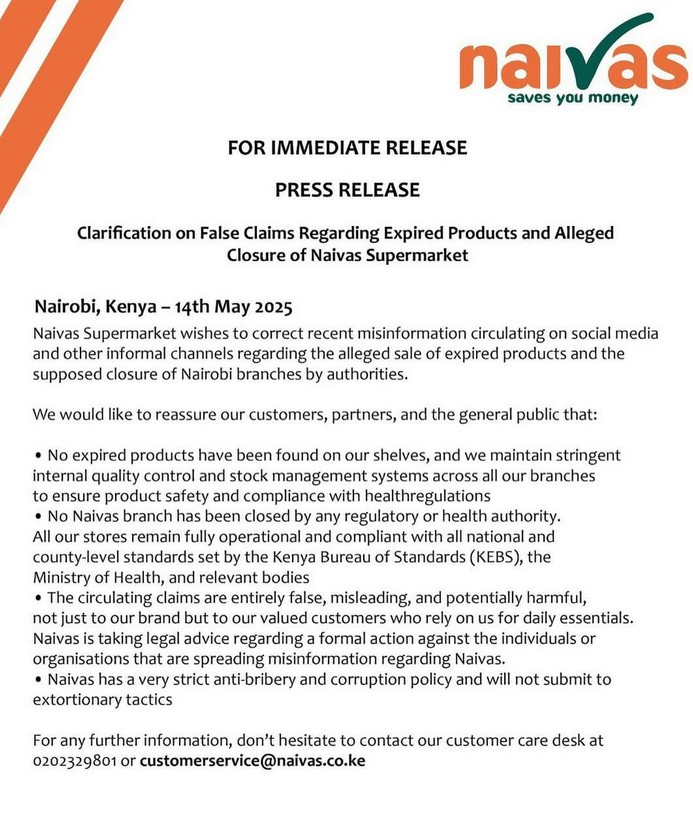The Nairobi County has closed all Naivas Supermarket Branches in Nairobi. The county claims that the branches are selling expired products. In a response,Naivas claimed that Nairobi County officials wanted a bribe but the company refused to part with something. They were angered ,which is why they ordered for the closure of the branches.
Here is the letter by the supermarket.

Shortly,Nairobi County responded by clearly outlining the roles of MCAs. They also threatened to sue the supermarket.
RESPONSE TO NAIROBI COUNTY ASSEMBLY HEALTH COMMITTEE STATEMENT
Re: Misinterpretation of Oversight Mandate and Misrepresentation of Authority
Date: 14th May 2025
We note with concern the statement issued by the Nairobi City County Assembly Health Committee alleging that Members of the County Assembly (MCAs) conducted a routine inspection at Naivas Moi Avenue branch, during which expired goods and uncertified food handlers were allegedly discovered. We wish to respectfully address this statement in alignment with the Constitution of Kenya and relevant legislation.
1. Clarification on the Role of MCAs
Under Article 185 of the Constitution of Kenya (2010):
“The legislative authority of a county is vested in, and exercised by, its county assembly.”
The primary functions of the County Assembly include:
• Enacting laws relevant to the county as per Schedule Four of the Constitution;
• Approving plans, budgets, and policies of the county government;
• Oversight of the county executive (not enforcement or operational implementation).
Nowhere in the Constitution or law is the County Assembly or its committees granted powers to execute direct inspections, conduct operational audits, or enforce regulations. These are executive functions, delegated under law to the relevant departments and officers.
2. Enforcement Mandate Lies with Executive Institutions
Operational enforcement, such as health inspections, is the legal mandate of the County Executive Committee Member (CECM) for Health, exercised through appointed public health officers under the following laws:
• Public Health Act (Cap 242): Grants enforcement powers to public health officials, not legislators;
• Food, Drugs and Chemical Substances Act (Cap 254): Assigns responsibility for compliance and enforcement to health inspectors;
• County Governments Act (2012), Section 30: Vests executive authority in the Governor and delegates operational duties to county departments and officers.
If a public health issue arises, only these designated officials may lawfully conduct inspections, issue compliance orders, or close premises, following due process and documentation. Therefore, the statement by the Health Committee claiming to have conducted “routine inspections” is ultra vires, meaning outside their legal authority.
3. Support for Naivas Supermarket’s Position
Naivas Supermarket’s response correctly emphasizes that:
• No regulatory or health authority has closed any of its stores;
• Its internal systems ensure compliance with safety standards set by Kenya Bureau of Standards (KEBS), the Ministry of Health, and county health departments;
• Any claims about operational breaches must be verified and acted upon by mandated agencies—not legislative bodies or individuals acting outside their scope.
4. Due Process and Accountability
We encourage any MCA or public official with evidence of malpractice to follow the law by:
• Reporting to the Directorate of Criminal Investigations (DCI);
• Engaging the Ethics and Anti-Corruption Commission (EACC) for investigations of misconduct;
• Refraining from issuing threats, public accusations, or engaging in enforcement-like actions without legal authority.
5. Conclusion
The principle of separation of powers and rule of law must guide the conduct of all public officers. Oversight does not equate to interference or usurpation of executive duties.
Naivas Supermarket is within its rights to demand protection from reputational damage and operational disruption caused by actions or statements outside constitutional and legal frameworks. We call on the Nairobi City County Assembly to respect constitutional mandates and allow competent authorities to discharge their duties professionally and lawfully.
Issued by:
Legal & Constitutional Governance Watch
Nairobi, Kenya
14th May 2025













